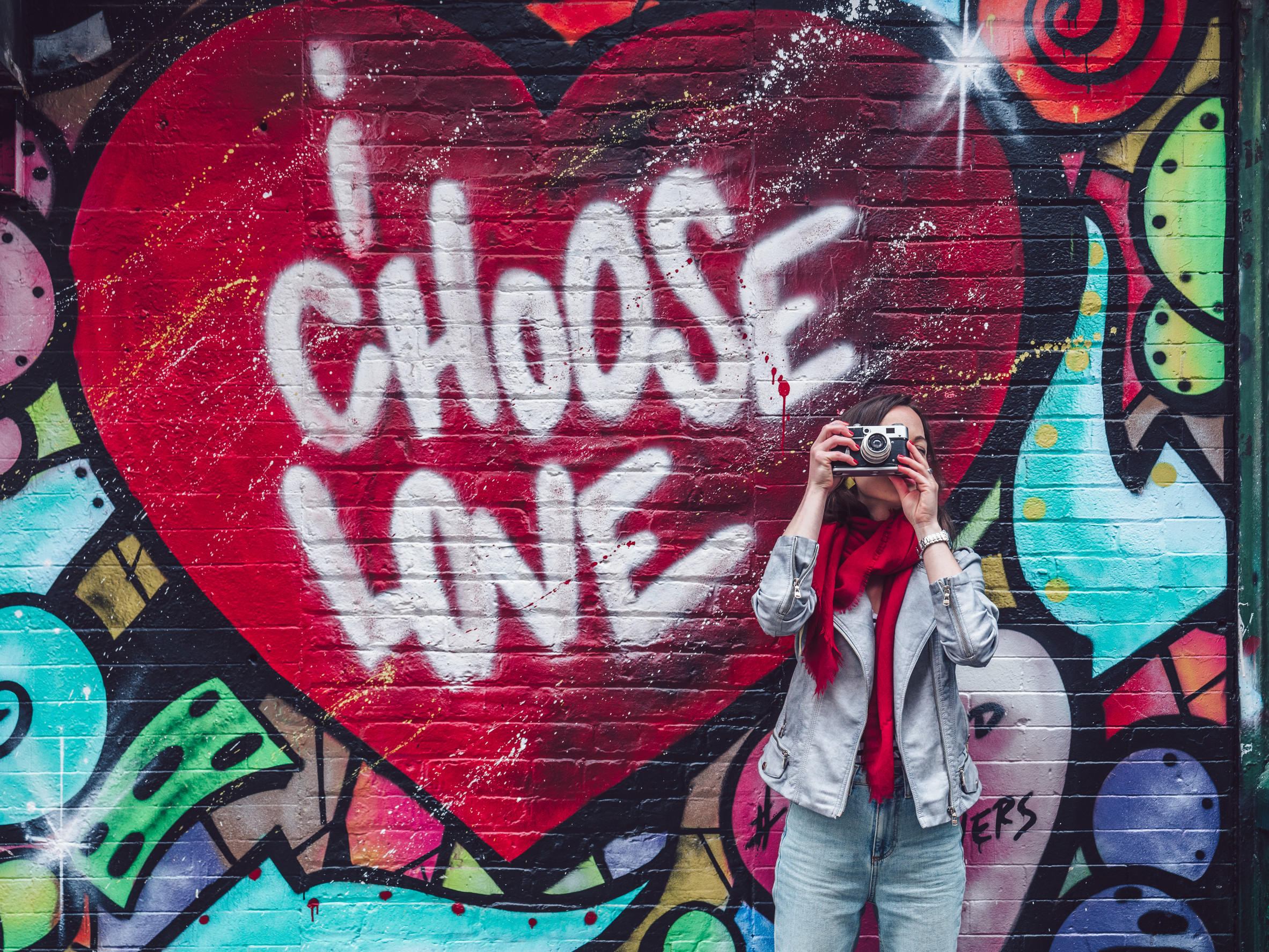Choosing Love Over Division to
Create Deeper Connections
 Image Source: deklofenak; "Young photographer by the wall with graffiti outdoors.", 2025. Accessed via https://www.123RF.com/photo_115788524, Standard License.
Image Source: deklofenak; "Young photographer by the wall with graffiti outdoors.", 2025. Accessed via https://www.123RF.com/photo_115788524, Standard License.Because our lives are filled with competing priorities and differing perspectives, cultivating love and connection remains our most fulfilling endeavor. Yet often without realizing it, we undermine this very goal through subtle habits that create division rather than unity. Understanding how to recognize and transform these patterns can revolutionize our relationships and inner peace.
The Invisible Dividers
Many of us genuinely desire close connections yet unconsciously engage in behaviors that push others away. As Proverbs 17:9 wisely observes, "Whoever would foster love covers over an offense, but whoever repeats the matter separates close friends." This ancient wisdom highlights a psychological truth: dwelling on past transgressions creates separation.
Consider these common scenarios:
- Mentally cataloging someone's past mistakes while interacting with them
- Sharing unflattering stories about friends or family with others
- Repeatedly bringing up resolved issues during new disagreements
- Using past patterns as evidence of someone's unchangeable character
Each instance reflects our brain's natural negative bias. Research suggests up to 80% of our spontaneous thoughts skew negative—a survival mechanism that once protected us but now often sabotages our relationships.
The False Promise of Resentment
When we continuously revisit offenses we've supposedly forgiven, we create a contradiction. We claim to have moved forward while simultaneously anchoring ourselves to the past. This inconsistency manifests as:
- Passive-aggressive comments ("I've forgiven you, but...")
- Conditional trust ("I'll give you another chance, but I'll be watching...")
- Bringing up old wounds during unrelated conflicts
- Using past mistakes to explain current behavior
These patterns create a self-fulfilling prophecy. By expecting the worst, we prime ourselves to notice confirmatory evidence while dismissing contradicting positive behaviors.
The Intentional Path to Love
Creating love requires more than passive goodwill—it demands intentional practice and commitment. Unlike division, which happens automatically through our negative bias, connection requires conscious cultivation.
- Practice True Forgiveness
Authentic forgiveness isn't just saying the words; it's making the daily choice not to revisit the offense. When thoughts of past transgressions arise, acknowledge them without giving them power. Redirect your focus to the present moment and your values around connection.
- Create Positive Reference Points
Our brains build neural pathways through repetition. Create a practice of noticing positive qualities in others. One effective approach is keeping a small notecard with intentions like "I will focus on strengths" or "I will respond with patience." As one practitioner describes it, "I referee myself as I live in the game of life."
- Develop Response Rituals
When triggered toward division, having prepared responses creates space for better choices:
1. Pause before speaking when feeling reactive
2. Ask yourself, "Will this comment build connection or division?"
3. Mentally reframe the situation from the other person's perspective
4. Choose one positive quality to focus on during difficult interactions
- Transform Communication Patterns
Small adjustments in how we communicate can dramatically shift relationship dynamics:
1. Replace criticism with specific requests
2. Express appreciation before addressing concerns
3. Focus conversations on the present rather than past patterns
4. Catch yourself mid-gossip and redirect toward understanding
- Recognize That Everyone Struggles
Remember that everyone—including you—is navigating their own challenges. This perspective fosters compassion rather than judgment when others fall short. As we extend grace to others, we create space for authentic connection.
The Ripple Effect of Choosing Love
When we consistently choose connection over division, we don't just improve individual relationships—we transform our entire social ecosystem. Each interaction becomes an opportunity to create more love in the world.
Etiquette and politeness serve as practical vehicles for this transformation. These social conventions aren't merely superficial niceties but powerful tools that help us navigate differences with respect and care. They provide structure when emotions might otherwise lead us toward division.
By committing to self-awareness and intentional "Let them." "Let me" responses, we can override our brain's negative bias and create spaces where love flourishes. Even in polarized times, we can choose, one day at a time, to be architects of connection rather than division.
The journey toward love begins with a single choice, repeated daily: to see beyond offenses, to focus on the good, and to believe in the possibility of genuine connection—even when it seems most challenging.














